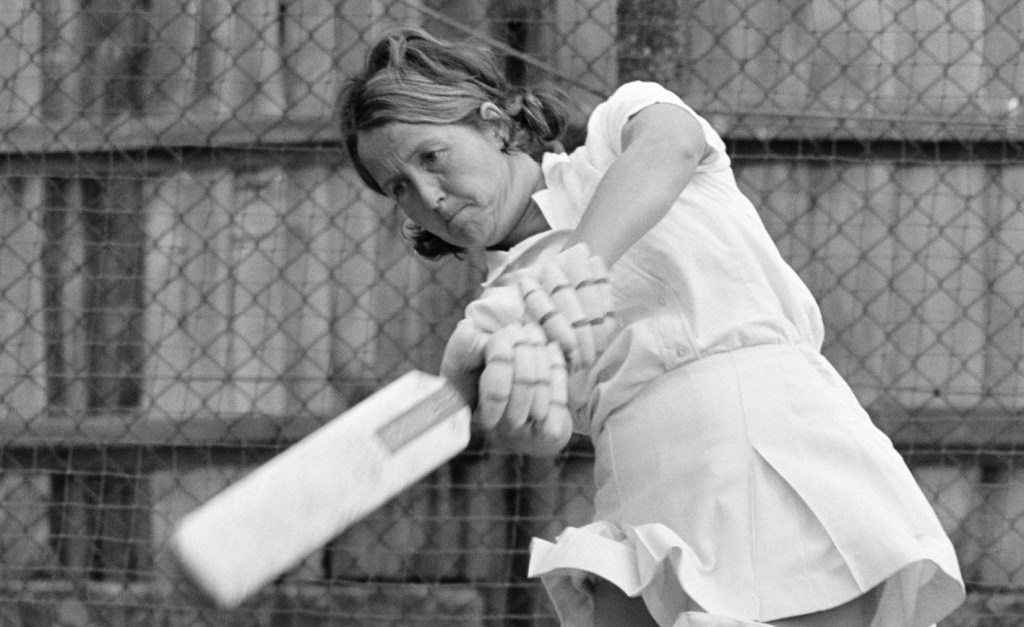In The Times today Michael Atherton argues that Rachel Heyhoe-Flint should have a statue at Lord’s. For once I don’t think that Athers has thought this through.
It was in 1963 that CLR James, adapting Kipling, asked the question “What do they know of cricket who only cricket know?” That quote illustrated perfectly the dilemma once faced by cricket lovers about South Africa. In 1960, with Apartheid firmly in place, Rachel Heyhoe had been a member of an English women’s team touring the country. In her autobiography she revealed that the tourists had been warned “…to make absolutely no comment on the ‘racial issues’ (sic) in the country)”. Black spectators were banned at the matches and the coaching the English women did was only for the whites. The British Women’s Cricket Association (WCA), in which Rachel played a significant role for many years said that the 1960 tour “engendered goodwill”. Not with black South Africans it didn’t !

Rachel obeyed the rules in 1960 but by 1978 when her memoir was published, she revealed her true feelings “[I] retained the view that it was their country, and hardly the place of any English people to criticise”. This was a naïve even offensive remark, not least because it was made ten years after the D’Oliveira Affair and seven after South Africa had been banned from all international sport.
Rafaelle Nicholson, a historian of Women’s cricket, has written that “in the build up to the D’Oliveira Affair, it was the women’s cricket community who continued to wholeheartedly to embrace South Africa.” The WCA was in the forefront of this, and Rachel Heyhoe played a significant part as player and later administrator. In 1968 once MCC cancelled the men’s tour to South Africa over D’Oliveira the WCA followed suit cancelling their own planned cricketing stopover. Nicholson writes further “Several members of the [WCA] Executive Committee had wanted to go ahead with the stopover… but had been outvoted. Presumably, this included England Captain Heyhoe-Flint, who told The Times that she was “very disappointed”.
Rachel’s position on Sport and Apartheid was made crystal clear in her autobiography “[if] the British Government consider it their duty to register their disapproval of South African policies I suggest they cut off every contact with them, including banking and trading links. For, as things stand, sport is merely being used as a political lever. Who are we, in any case, to tell the South Africans how to run their country”?
Rachel’s posture on South Africa, including her participation with many luminaries of the world of cricket to try and ensure that the planned 1970 men’s tour took place, was unequivocal. Her position was a cricket establishment one and many joined her in the “1970 Cricket Fund” which was to pay for security to allow the games to take place. Those in cricket who opposed to the tour, most notably Mike Brearley and the Rev. David Sheppard, were in a minority.
The moral high ground was with Brearley and Sheppard and history has proven them not Heyhoe-Flint and her fellow South Africa appeasers to have been right. Rachel unquestionably deserves the accolades she received for her active support for Women’s cricket and for opposing the discrimination against women at Lord’s and elsewhere. But I would have would have thought that the Life Peerage was enough.
A statue at Lord’s in these cancel culture times would be a provocation – but I oppose it not because it might be an activists’ target but because it’s a bad even offensive idea.
Thank you paddy. For more concrete evidence, look at her resignation in 86 from WCA. She was protesting the ban on their players touring SA as Unicorns. They were only doing it because sports council funding was threatened she argued.
But her moral failing – is that she believed in sporting equality ( women’s cricket could be as equally popular as men’s and deserved funding ) but sport was not for all colours to play together if that was the case in another country. It was more important cricket was played, than apartheid be defeated.
LikeLike
Thank you for your comment. You summarise it really well.
LikeLike
In the long list of evils the human race has proved to be capable of apartheid is near the top. To even consider playing cricket then and tacitly supporting white supremacy is unforgivable.
I agree Atherton has got this wrong but I dislike the principle of statutes and the honour system anyway.
LikeLike
I might support the launching of a statue of RH-F into the Regent’s Canal.
Not my usual MO, but Michael, really?
LikeLike
MCC failed to do their research and, more surprisingly, so did Athers.
LikeLike